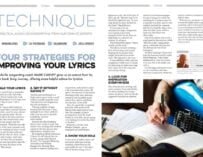Inspired by a Winnie-the-Pooh quote, the country singer-songwriter outlines eight ways to invite your subconscious mind into the writing room
“Hello, Pooh,” said Rabbit.
“Hello, Rabbit,” said Pooh dreamily.
“Did you make that song up?”
“Well, I sort of made it up,” said Pooh. “It isn’t brain,” he went on humbly, “because You Know Why, Rabbit; but it comes to me sometimes.”
“Ah!” said Rabbit, who never let things come to him, but always went and fetched them.
— from Winnie-the-Pooh by A.A. Milne
The best co-writer I’ve ever had is what I’ve called at various times my gut, my instinct, my truth-bone, my right brain… my subconscious mind. The knowing that seems to emanate from somewhere in my body always leads to a deeper truth, a better grasp on whatever it is I’m trying to pull out of the air. Learning the craft of songwriting is essential – structure, form, melody, rhyme – but without a story to tell, the most perfectly constructed song lacks a centre. And sometimes the real story is buried deep inside the song you think you’re trying to write, like a set of Russian nesting dolls.
But how to dig down and get to it? As Winnie-the-Pooh said, “it isn’t brain.” We’re conditioned from birth to apply our linear, logical mind to every problem. No schoolteacher ever said, “Just sit with it, for weeks if necessary, and see what your body tells you.” As a result, we tend to distrust and discount the processes of the right brain. Through trial and error and over years of writing, I’ve learned to back off and let the real story come to me instead of chasing it. I’ve learned to connect with my right brain and collaborate with it.
1. KEEP GATHERING
Gather ideas and snippets of lyrics that feel important. You don’t have to know why just yet.
2. EDIT LATER
Keep your internal editor out of the room while you play. The first part of the creative process is delicate and full of possibility. Wait until you have fully explored your idea before you start to edit and “kill your darlings”.
3. LET IT LIE
Let things lie dormant for a while. Your subconscious mind is still working on them. This is why when you walk away from anything, from a writing session to a crossword puzzle, the right word or phrase will pop into your head hours or days later (this is also why co-writing is problematic for me; many co-writers want to finish a song right away. If you co-write, find a co-writer who understands this).
4. BE DISTRACTED
Use distraction to avoid over-handling the song. A song idea is like a lump of bread dough; it’ll never rise if you knead it too much. Stop applying so much pressure and distract yourself by moving to a different song. I always have a pile of eight to ten songs going at one time for this very reason.
5. WALK IT OFF
Or distract yourself with rhythmic physical movement. Walking is the best way I know to engage my right brain. Take a walk with your song. Let your mind wander. Don’t consciously try to work out whatever writing problem you’re stuck on – just move, and see what happens.
6. TAKE A NAP
Seriously. I’ve never had a writing room that didn’t have a couch or a bed in it. Short naps put your brain into a particularly receptive state – the space between sleep and wakefulness – that’s where you want to be. Take it from Albert Einstein, Mary Shelley, Salvador Dali and Thomas Edison.
Are you fighting the song? The song will tell you what it wants to be; but sometimes it’s not the song you wanted to write. In my experience, it’s always better to follow the song’s lead. Its inspired bits are clues to where you are going; clinging to its origins will get you nowhere.
7. FIND THE CHARACTERS
Find the characters and listen to them. Invite them in, live with them for a while. Let them tell you who they are, how they feel. When you create a character (and all songs have characters, even if they are “you” and “me”), at some point he or she will start to live inside you. Author Andre Dubus said, “During my very early writing… I began to learn characters will come alive if you back the fuck off. It was exciting, and even a little terrifying. If you allow them to do what they’re going to do, think and feel what they’re going to think and feel, things start to happen on their own. It’s a beautiful and exciting alchemy.”
8. GIVE IT A DAY
When your song has taken on some form and shape, and you’re ready to record a rough version, put the recording away for at least 24 hours. Then listen back to your in-process song. See how your body reacts. What feels good about it? What feels false, or forced? Listen for the truth, and most important, listen for the lies. Listen with your body, and listen as if you had never heard it before.
If you can engage the part of you where the mysterious and inchoate live, where the emotional truth belies the facts, where the knowing is in your bones rather than your brain, you’ll find a rich and abundant vein of songwriting inspiration.








![Interview: Jessie Jo Dillon [2025]](https://www.songwritingmagazine.co.uk/wp-content/uploads/jessie-jo-dillon-2-by-libby-danforth-335x256.jpg)


























I woke up this morning planning to write a song. I was inspired by this a few years ago after I heard Glenn Frye of The Eagles talk about how he learned about songwriting from Jackson Browne who lived beneath him in the apartment at the time. Songwriting was work! He said….. I’ve worked my entire adult life in the finance industry. However growing up in a musical family I never forgot my love for music. I have journals of songs I’ve written over the years and I’ve never done anything with them until only recently. Thank you for this article Gretchen. You gave me another “tool for my tool box” much like Glenn Frye. Especially #6! I got that from my mother who was a pianist. I’m still finding my “way” but I write every day! (Ha!) ….. the journals are multiplying but so are the song’s! Your article inspired me this morning! My financial career is behind me now for the most part….. and today I’m opening my toolbox to try my new tools I got from you! Thank you again!